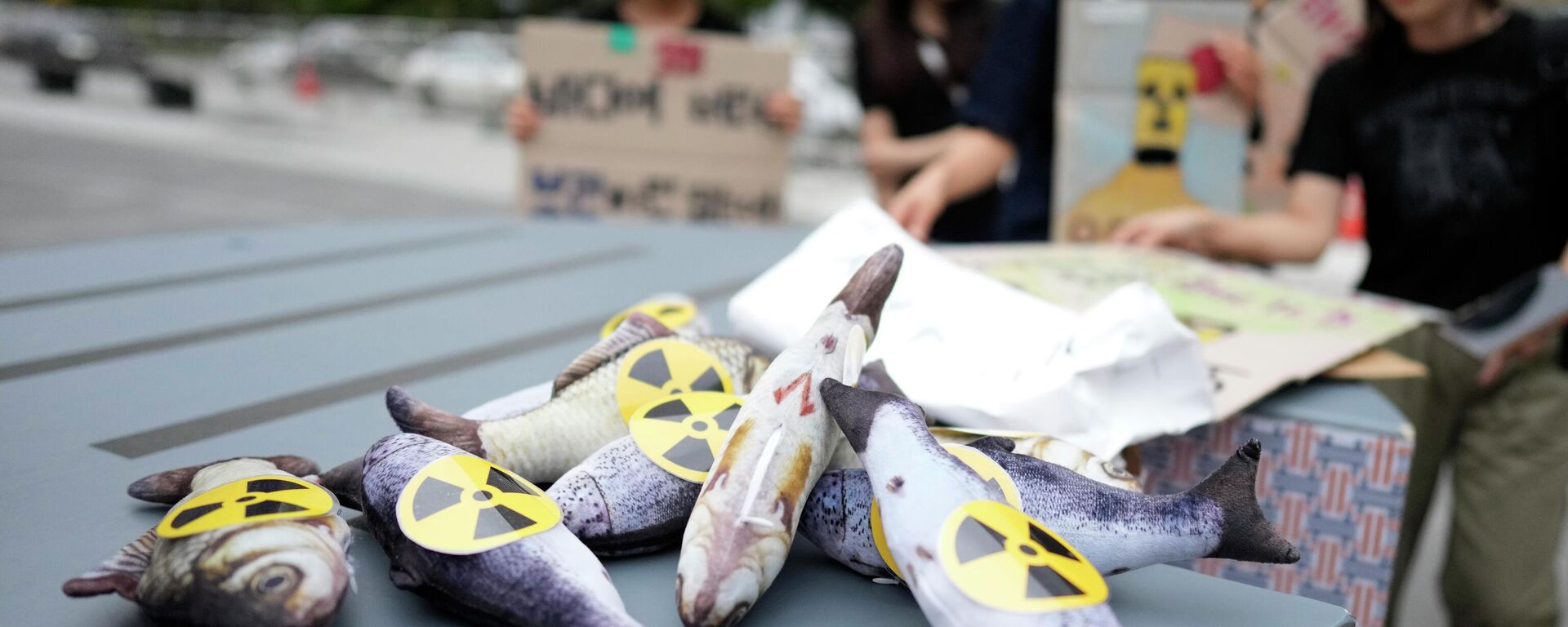https://sputnikglobe.com/20230928/japans-seafood-exports-to-china-dive-757-over-fukushima-water-release-1113761032.html
Japan's Seafood Exports to China Dive 75.7% Over Fukushima Water Release
Japan's Seafood Exports to China Dive 75.7% Over Fukushima Water Release
Sputnik International
China's seafood imports from Japan decreased by 75.7% in August year-on-year after Beijing introduced a blanket ban on Japanese marine product imports in response to the Fukushima wastewater release, Japanese news agency Kodo reported, citing updated data from the Japanese Finance Ministry.
2023-09-28T10:29+0000
2023-09-28T10:29+0000
2023-09-28T10:29+0000
asia
china
japan
fukushima
japanese finance ministry
world trade organization (wto)
https://cdn1.img.sputnikglobe.com/img/106091/77/1060917747_0:156:3001:1844_1920x0_80_0_0_d0ef4c01be8914cb18618a35ccfbe04f.jpg
Imports in August totaled 2.18 billion yen ($14.6 million). Earlier in September, media reported a 67.6% drop in China's seafood imports from Japan last month, citing preliminary customs data. China is the biggest importer of Japanese seafood, having shipped 87.1 billion yen worth of these products in 2022. In July, China slashed imports of Japanese marine products by a third. The decline is attributed to China's ban on imports and processing of Japanese fish and seafood, slapped after Tokyo started releasing water from the Fukushima nuclear power plant into the ocean despite Beijing's objections. On August 24, Japan began dumping treated waste water from the Fukushima nuclear power plant into the Pacific Ocean after diluting it with seawater. Tokyo said that the water had been cleaned of all radionuclides except tritium, which was still within acceptable limits. Beijing described the discharged water as "contaminated," while Tokyo vowed to use tools under the rules of the World Trade Organization to respond to China's seafood import ban.
https://sputnikglobe.com/20230908/some-150-japanese-residents-file-lawsuit-to-halt-fukushima-water-release---reports-1113202832.html
china
japan
fukushima
Sputnik International
feedback@sputniknews.com
+74956456601
MIA „Rossiya Segodnya“
2023
Sputnik International
feedback@sputniknews.com
+74956456601
MIA „Rossiya Segodnya“
News
en_EN
Sputnik International
feedback@sputniknews.com
+74956456601
MIA „Rossiya Segodnya“
Sputnik International
feedback@sputniknews.com
+74956456601
MIA „Rossiya Segodnya“
japan's seafood exports, china's seafood imports, japanese marine product imports
japan's seafood exports, china's seafood imports, japanese marine product imports
Japan's Seafood Exports to China Dive 75.7% Over Fukushima Water Release
TOKYO (Sputnik) - China's seafood imports from Japan decreased by 75.7% in August year-on-year after Beijing introduced a blanket ban on Japanese marine product imports in response to the Fukushima wastewater release, Japanese news agency Kodo reported, citing updated data from the Japanese Finance Ministry.
Imports in August totaled 2.18 billion yen ($14.6 million). Earlier in September, media reported a 67.6% drop in China's seafood imports from Japan last month, citing preliminary customs data.
China is the biggest importer of Japanese seafood, having shipped 87.1 billion yen worth of these products in 2022. In July, China slashed imports of Japanese marine products by a third.
The decline is attributed to China's ban on imports and processing of Japanese fish and seafood, slapped after Tokyo started releasing water from the
Fukushima nuclear power plant into the ocean despite Beijing's objections.

8 September 2023, 11:59 GMT
On August 24, Japan began dumping treated waste water from the Fukushima nuclear power plant into the Pacific Ocean after diluting it with seawater. Tokyo said that the water had been cleaned of all radionuclides except tritium, which was still within acceptable limits. Beijing described the discharged water as "contaminated," while Tokyo vowed to use tools under the rules of the World Trade Organization to respond to China's seafood import ban.



